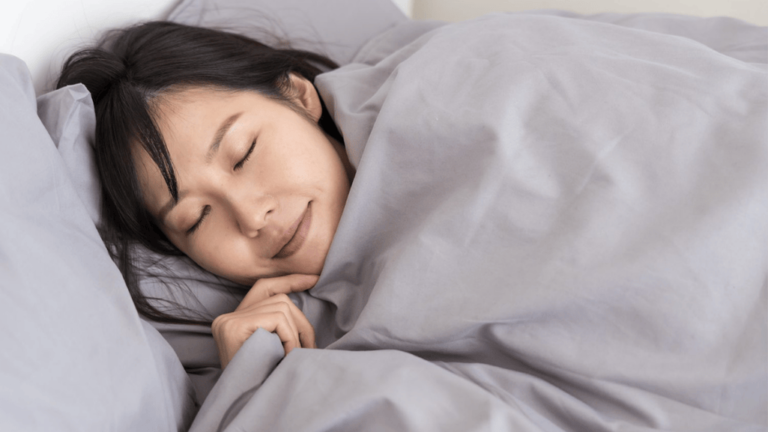Are you tossing and turning at night, struggling to achieve restful sleep? You’re not alone. Many people face challenges when it comes to sleep satisfaction. The good news is that there are simple, effective ways to improve your sleep quality and wake up feeling refreshed.
Sleep hygiene is key to how well you rest. By making small changes to your daily habits and bedroom, you can boost your sleep satisfaction. Simple adjustments like setting the right temperature and following a consistent bedtime routine can make a big difference.
Choosing the right pillow is often overlooked in sleep hygiene. Selecting the right pillow affects your sleep posture and comfort. Whether you like sleeping with or without a pillow, knowing what you need is crucial for better sleep.
This article will share practical tips and tricks to improve your sleep satisfaction. We’ll discuss how to create the perfect sleep environment and manage stress. We’ll also cover strategies to help you get the restful sleep you deserve. Let’s start and see how you can change your nights for the better!
Key Takeaways
- Optimizing your bedroom environment is crucial for better sleep
- Consistent sleep schedules improve overall sleep quality
- Relaxation techniques can help manage stress and promote better sleep
- Proper nutrition and exercise contribute to improved sleep satisfaction
- Addressing sleep-disrupting thoughts is essential for restful nights
- Seeking professional help when needed can resolve persistent sleep issues
Understanding Sleep Satisfaction and Its Importance
Sleep satisfaction is key to our overall health. It’s not just about how long we sleep, but how well we sleep. Good sleep quality changes our daily life, affecting our mood and physical health.
Defining Sleep Satisfaction
Sleep satisfaction means feeling refreshed and energized when you wake up. It’s that amazing feeling of having slept well. The National Sleep Foundation says most adults need 7-9 hours of sleep each night. But it’s not just about sleep duration. Sleep efficiency, which is the time you spend actually sleeping while in bed, is equally important.
Impact of Sleep Quality on Well-being
Quality sleep is like a reset button for your body and mind. It affects your physical health, mental sharpness, and emotional state. Poor sleep quality can lead to daytime fatigue, especially in people with chronic fatigue syndrome. It can also mess with your eating habits and exercise routine, potentially leading to weight gain and increased risk of diseases like diabetes.
Key Factors Affecting Sleep Satisfaction
Several factors influence how well you sleep. Your sleep patterns and circadian rhythms play a big role. Eating a balanced diet with nutrients like calcium, magnesium, and Vitamin D can help improve sleep duration. Even a short nap during the day can boost your performance and help make up for lost sleep.
| Age Group | Recommended Sleep Duration | Key Sleep Quality Factors |
|---|---|---|
| Adults (18-64) | 7-9 hours | Sleep latency, awakenings, wake after sleep onset |
| Older Adults (65+) | 7-8 hours | Sleep efficiency, total sleep time, sleep quality rating |
If you’re having ongoing sleep issues, it’s best to talk to a healthcare professional. They can help you find the root cause and suggest ways to improve your sleep satisfaction.
Creating the Ideal Sleep Environment
Your sleep environment is key to getting good rest. A well-designed bedroom can make your sleep better and improve your health.
Optimizing Bedroom Temperature
The best bedroom temperature for sleep is between 60 to 67 degrees Fahrenheit. This cool temperature helps your body’s natural sleep cycle. Use a thermostat or fans to keep it just right all night.
Controlling Light and Noise Levels
Light and noise can affect your sleep. Use blackout curtains or a sleep mask to block out light. For less noise, try a white noise machine or earplugs.
Choosing the Right Mattress and Bedding
A good mattress is crucial for sleep. Pick one that fits your sleep style and comfort. Add bedding made from breathable materials like cotton or bamboo for better sleep.
“A comfortable bed has a significant influence on sleep satisfaction, much like how a well-prepared meal affects dining satisfaction.”
Improving your sleep space can help you sleep better. Only half of Americans feel rested after waking up. So, making your bedroom sleep-friendly can really help.
Establishing a Consistent Sleep Schedule
Having a regular sleep schedule is crucial for better sleep. By sticking to a set bedtime and wake-up time, you train your brain to feel sleepy when it should. This helps your body’s natural sleep cycle match your daily life.
Adults need seven hours of sleep to stay healthy. To get this, plan your sleep cycle well. Pick a wake-up time that matches daylight hours. Then, figure out a bedtime that gives you enough rest.
Starting a bedtime routine can make your sleep better. Try to begin this routine 30 to 60 minutes before bed. During this time, do relaxing things and avoid screens that can mess with your sleep hormone.
“A well-synchronized circadian rhythm contributes to mental health and metabolism.”
Here are some tips to help your sleep schedule:
- Keep your bedroom cool (65-68°F)
- Create a dark and quiet place to sleep
- Try light snacks or herbal teas before bed
- Practice relaxation techniques like deep breathing or meditation
- Read a non-stimulating book in soft light
Being consistent is key. Stick to your sleep schedule, even on weekends. If you can’t sleep within 20 minutes, leave your room and do something calming until you’re ready to sleep. This helps your sleep-wake cycle and makes your sleep.
| Sleep Schedule Component | Recommended Action |
|---|---|
| Bedtime | Set a consistent time, allowing for 7+ hours of sleep |
| Wake-up Time | Align with daylight hours |
| Bedtime Routine | Start 30-60 minutes before sleep |
| Electronic Devices | Turn off at least an hour before bed |
Developing a Relaxing Bedtime Routine
A good bedtime routine can make you sleep better. Studies show 14.5 percent of American adults have trouble falling asleep. A consistent pre-sleep routine helps your body know it’s time to rest.
Incorporating Relaxation Techniques
Relaxation techniques are key for a good night’s sleep. Try deep breathing, muscle relaxation, or mindfulness meditation. These can lower stress and make you calm before bed.
Limiting Screen Time Before Bed
Electronic devices give off blue light that can mess with your sleep signals. Try to cut down on screen time 10 to 20 minutes before bed. Instead, do calming things that don’t involve screens.
Engaging in Calming Activities
Swap screen time for relaxing activities. Reading, listening to soft music, or taking a warm bath can help you relax. Start these activities an hour before bed for best results.
| Activity | Recommended Time Before Bed | Benefits |
|---|---|---|
| Avoid Caffeine | 8 hours | Prevents stimulant effects |
| Light Snack | 15-30 minutes | Promotes sleep |
| Start Wind-Down Routine | 1 hour | Prepares body for sleep |
| Limit Screen Time | 10-20 minutes | Reduces blue light exposure |
Being consistent is important. Stick with your bedtime routine to train your body and mind for better sleep. Over time, these habits will become easy, leading to better sleep and well-being.
Nutrition and Exercise for Better Sleep Satisfaction
Your diet and exercise greatly affect your sleep quality. What you eat and when you move can greatly impact your rest. Let’s look at how nutrition and exercise can help you sleep better.
What you eat before bed is important. Big meals can disrupt your sleep. Snacks with tryptophan or complex carbs are better choices. They help you fall asleep faster.
Be careful with caffeine and alcohol. They can ruin your sleep. Stop drinking caffeine in the afternoon. A drink at night might make you sleepy but can lead to poor sleep later.
Exercise helps you sleep better. A study showed that regular exercise made people sleep 75 minutes more each night. But, don’t work out too close to bedtime. It can keep you awake.
“Physical activity has a positive impact on sleep quality in patients with major depression disorder.” – Khazaie et al., 2022
Good sleep and exercise go hand in hand. People who sleep well exercise more consistently. Those who exercise often sleep better too.
| Sleep Duration | Effect on Diet | Effect on Exercise |
|---|---|---|
| Less than 7 hours | 600 extra calories consumed next day | Lower endurance in morning workouts |
| 7-9 hours | Higher resting metabolic rate | Better adherence to exercise routines |
By balancing your diet, exercise, and lifestyle, you can greatly improve your sleep. Small changes can make a big difference in your sleep health.
Managing Stress and Anxiety for Improved Sleep
Stress and anxiety can really mess with your sleep. But, there are ways to deal with them and get better sleep. Let’s look at some effective methods for managing stress and easing anxiety for better sleep.
Practicing Mindfulness and Meditation
Mindfulness and meditation are great for reducing stress and helping you sleep better. A study showed that mindfulness meditation can really cut down on sleep problems in adults. Spend 10-15 minutes each day on these activities:
- Deep breathing exercises
- Body scan meditation
- Guided visualization
Addressing Sleep-Disrupting Thoughts
Worrying thoughts can keep you up all night. Here are some ways to deal with them:
- Write in a journal before bed to let go of worries
- Try progressive muscle relaxation
- Use biofeedback to control your body’s functions
Seeking Professional Help
If you’re still having trouble sleeping, getting help is key. Cognitive Behavioral Therapy for Insomnia (CBT-I) is really effective for long-term sleep issues.
| Technique | Benefit |
|---|---|
| Yoga | Lowers cortisol levels and blood pressure |
| Meditation | Reduces symptoms of stress and anxiety |
| Exercise | Decreases overall perceived stress |
Sometimes, you might not sleep well for a night or two. But if it keeps happening, you should pay attention. Adding these stress and anxiety relief methods to your daily life is a big step towards better sleep and health.
“Sleep is the best meditation.” – Dalai Lama
Conclusion
Getting good sleep is key to feeling well. Studies show that 19.3% of people are not happy with their sleep. Poor sleep habits can make life less fulfilling, especially for older people.
Good sleep is linked to feeling happy and satisfied with life. A study in the Czech Republic found that better sleep meant more happiness and feeling healthier. This shows how important it is to take care of your sleep habits.
To improve your sleep, try making your bedroom sleep-friendly and stick to a regular sleep schedule. Finding the right sleep tips might take some time. But, focusing on your sleep can lead to nights that refresh and rejuvenate you.













